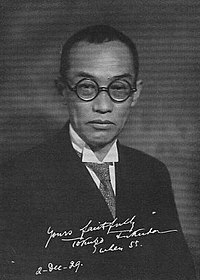Fukuda Tokuzo
Fukuda Tokuzō ( Japanese 福田 徳 三 , * December 2, 1874 , † May 8, 1930 ) was a pioneer of Japanese economics. He introduced the Sociopolitical School and the Younger Historical School, Economic Theory and Economic History .
He graduated from Tokyo Higher Commercial School, now Hitotsubashi University . After becoming a lecturer at his alma mater, he studied in Germany, among others with Karl Bücher , and received his doctorate at the University of Munich with Lujo Brentano with a thesis on "The social and economic development in Japan".
After returning to Japan, he became a professor at his alma mater and at Keiō University . One of his students is the economist Koizumi Shinzō .
During the Taishō democracy he founded the Reimeikai ("sunrise society") together with Yoshino Sakuzō and devoted himself to the enlightenment of democracy. After the First World War he committed himself to democracy ( liberalism ) - supported from a critical standpoint towards Marxism - and called for the government to solve social and labor problems. He is also considered a pioneer of the welfare state idea . He also prepared political drafts as an advisor to the Ministry of the Interior.
Individual evidence
literature
- S. Noma (Ed.): Fukuda Tokuzō . In: Japan. An Illustrated Encyclopedia. Kodansha, 1993, ISBN 4-06-205938-X , p. 426.
Web links
- Literature by and about Fukuda Tokuzō in the catalog of the German National Library
- Fukuda Tokuzo. Biographical Database of Keio Economists, accessed September 19, 2013 (Japanese).
| personal data | |
|---|---|
| SURNAME | Fukuda Tokuzo |
| ALTERNATIVE NAMES | 福田 徳 三 (Japanese) |
| BRIEF DESCRIPTION | Japanese economist |
| DATE OF BIRTH | December 2, 1874 |
| DATE OF DEATH | May 8, 1930 |
